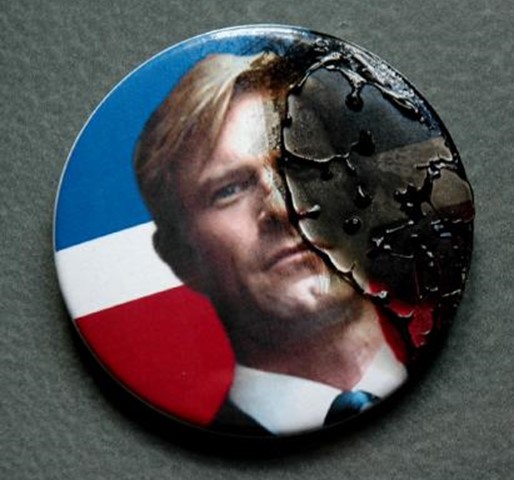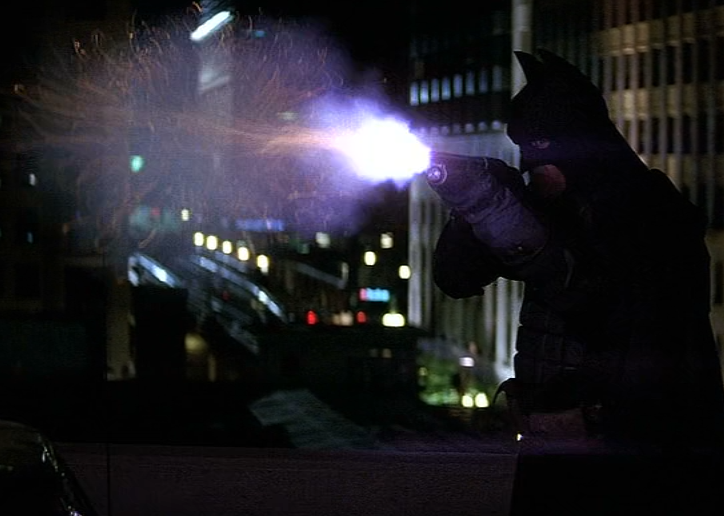Is Batman Keeping Gotham City Poor?
July 16, 2012 in Editorial

In Why Nations Fail Daron Acemoglu and James Robinson attempt to explain why certain areas of the world remain under-developed. In Batman Begins and The Dark Knight, Bruce Wayne becomes Batman in the hopes of bringing stability to Gotham City which has severe economic problems. But the analysis presented in Why Nations Fail suggests that Batman is, in fact, making the problem even worse.
To begin with, there is little doubt that Gotham city has failed economically. The economic institutions are what the book’s authors would call extractive – we see countless instances of mobsters and even police officers getting rich of off the labour of others by expropriating their profits. The authors also define extractive political institutions as those which are neither centralized nor pluralistic. The fact that there is an entire area of Gotham City (“The Narrows”) that police officers refuse to visit demonstrates that the city is not centralized. And political power is concentrated in the hands of a corrupt few.
Batman contributes to this problem. As Bruce Wayne he has a fundraiser for the District Attorney Harvey Dent which would ensure that Dent will “never need another cent.” In one swoop Wayne offers to massively concentrate power into Dent’s hands. With the connections that Dent makes it is possible that Dent could fund a campaign to become mayor of Gotham. Yet the book Why Nations Fail shows us that a narrow elite replacing the person on the top of a set of extractive institutions rarely helps to make the system better. More often than not the new head simply becomes corrupted and uses the same institutions to enrich themselves. Harvey Dent’s subsequent descent into 2-Face demonstrates that he is corruptible.

Moreover Batman actually makes the problem of instability worse. Throughout the two movies the police is said to be chasing Batman, labeling him an outlaw vigilante. Yet the failure to capture him sends a clear message to the public that the police is unable to enforce the law. This makes it less likely that individuals will invest or start a business, since now they not only have to be worried about corrupt police officers or the mob demanding payments from them, but also a man dressed like a bat descending from the shadows because he believed that they broke the law.
We also see in the beginning of The Dark Knight copycat Batmen who follow Bruce’s example and go after mobsters. These Batmen are lawless vigilantes armed with guns. Gotham is looking more and more like a city that is descending into civil war. This is not surprising as the authors of Why Nations Fail point out that as long as the underlying extractive institutions are intact, groups of people will fight each other to take control of these institutions and enrich themselves, creating the conditions for a civil war.

And let’s not forget the laws that Batman himself breaks. The amount of property damage he causes alone is concerning. He destroys vehicles and blows up buildings, at times, unnecessarily. Those affected have no recourse to getting reimbursed for their damages, meaning that private property – the key to economic stability – is even further threatened while Batman is around.
The best way to help Gotham is to have a popular movement that is supported by a broad coalition and not just a narrow elite. This movement should focus not only on replacing the current leaders of Gotham, but should also work to alter the underlying extractive political and economic institutions of Gotham City. Neither Bruce Wayne nor Batman do anything of this sort. At best Batman is doing absolutely nothing to save Gotham, and at worst, he’s contributing to the city’s demise.
Read our entire coverage of The Batman over here, and find out how much Bruce Wayne is worth. You can find this and other articles in our Editorials although for a selection of the best check out our Greatest Hits. And be sure to stay in touch:



also the statement that the police chasing batman will discourage investors is false as in almost every batman continuity and all of the main ones (eventually at least) the police work alongside batman for the most part. commissioner gordon is the wall that keeps police corruption to a minimum while batman takes down as many mobsters and gangs as possible, instantly taking down a large amount of the threats you said discouraged economic investors. batman being a symbol of hope and fighting back which he succeeds at in the dark knight continuity that you specifically appear to be mentioning here would potentially have the opposite effect batman has only been shown once unnecessarily destroying the property of innocents in that continuity and never does in others. covering what you said about the dent fundraiser, you say that it is a bad idea because dent “COULD” use it to fund a mayoral campaign except he couldn’t because he already had a district attorney campaign the reason was because dent benefited the city he locked up every single criminal behind bars with perfect airtight cases so that ends the arguement
Star in power.
Man, it’s been half a month and there’s been no other comments? Hilarious.
So much staying power with that ‘Daily Show’ namedrop, huh?
Um, no. Batman is not making the problem worse. See, Gotham is not underdeveloped. It is meant as a cross-section of American society. It has the richest of the rich and the poorest of the poor, much like New York City (or did you forget who the mayor was?) It has infrastructure out the wazoo.
In TDKR, crime of the heinous variety had largely been eradicated for almost eight years at the start of the film. Yes, it was passed under a lie only like five living people actually knew about, but it did good anyway. For a statement to be a lie, the person must know what he is saying is not true.
The criminals got the justice they deserved. So did the man whose false reputation and death led to the passage (his neck was broken by falling five or so stories.)
Remember, the poorest person in America, the schizophrenic bum walking drunk through an alleyway, is still in the top 30% of people in the world by the very nature of him being in America.